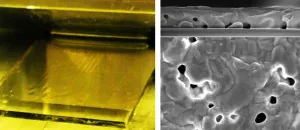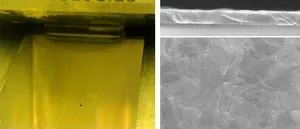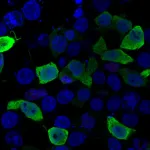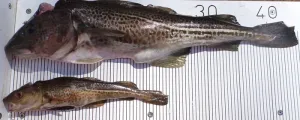(Press-News.org) Metal halide perovskites are considered to be a particularly low-cost and promising class of materials for next-generation solar modules. Perovskite solar cells can be produced with coating processes using liquid inks made from precursor materials and various solvents. After coating, the solvents evaporate and the perovskites crystallise to form a more or less homogeneous layer.
Options for upscaling
Prof. Dr. Eva Unger's team at Helmholtz-Zentrum Berlin has extensive expertise in solution-based processing methods and is investigating options for upscaling. "Perovskite photovoltaics is the best solution-processable PV technology available," says Eva Unger, "but we are only just beginning to understand how the complex interaction of the solvent components affects the quality of the perovskite layers."
Variations of viscosity
This is because when the halide perovskite layers are coated on large surfaces, unwanted inhomogeneities can occur, for example so-called ribbing structures. "By varying the viscosity of the ink, such effects can be minimised," says Jinzhao Li, who is doing his PhD with Unger. At BESSY II, he has investigated how different solvent combinations affect the crystallisation of the perovskite films. The best p-i-n-FAPbI3 perovskite solar cells thus achieve a certified efficiency of 22.3 % on a laboratory scale. Jinzhao Li also produced mini solar modules (active area of 12.6 cm2) with colleagues from the HySPRINT innovation lab and PVcomB, which achieved efficiencies of around 17 %.
Outdoor test for one year
Dr Carolin Ulbrich's team tested the optimised solar cells at PVcomB’s outdoor test facility for a whole year: In the process, the efficiency remained almost stable in winter and spring, and only dropped in the warmer summer months. "These tests of larger modules under real conditions give us valuable information on degradation mechanisms to then further improve the long-term stability of halide perovskite photovoltaics," says Eva Unger.
END
Perovskite solar cells from the slot die coater - a step towards industrial production
Eva Unger's team investigated at BESSY II how precursor inks influence the quality of perovskite thin films. The best cells were scaled up to minimodule size.
2023-03-16
ELSE PRESS RELEASES FROM THIS DATE:
Researchers highlight nucleolar DNA damage response in fight against cancer
2023-03-16
Cancer, which affects millions every year, requires proteins to spread through the body. In a new strategy to beat the wide-ranging disease, scientists are sabotaging its protein factories.
In a new forum paper published in Trends in Biology, researchers from the University of North Carolina at Charlotte encapsulated the young field of nucleolar DNA damage response (DDR) pathways. The review highlights six mechanisms by which cells repair DNA damage, including one which was published five months ago in Nucleic Acids Research by the same authors. By attacking these mechanisms, future applied researchers will be able to ...
Food security: New tool can forecast food insecurity up to 30 days in advance
2023-03-16
A new tool that can be used to forecast the prevalence of individuals within a country that may have insufficient access to food — known as food insecurity — up to 30 days into the future is presented in a study published in Scientific Reports. The authors suggest that the tool could aid decision makers in countries at risk of food insecurity and help facilitate more timely responses.
Elisa Omodei and colleagues developed the tool using food consumption data from Burkina Faso, Cameroon, Mali, Nigeria, Syria and Yemen — all countries that have recently ...
Study of immune ‘neighborhoods’ highlights macrophages as key players in invasive breast cancers
2023-03-16
Most immunotherapies, which aim to boost T cell activity, work poorly in treating estrogen receptor-positive (ER+) breast cancer. Targeting a different type of immune cell called macrophages could be a more effective approach, suggests a comprehensive new analysis of invasive ER+ breast cancers led by University of Pittsburgh School of Medicine scientists.
Published today in Nature Cancer, the study found that macrophages were the dominant immune cell infiltrating ER+ invasive lobular carcinoma (ILC) and invasive ductal carcinoma ...
Genetic causes of three previously unexplained rare diseases identified
2023-03-16
New York, NY (March 16, 2023) – Using a new computational approach they developed to analyze large genetic datasets from rare disease cohorts, researchers at the Icahn School of Medicine at Mount Sinai and colleagues have discovered previously unknown genetic causes of three rare conditions: primary lymphedema (characterized by tissue swelling), thoracic aortic aneurysm disease, and congenital deafness. The work was done in collaboration with colleagues at the University of Bristol, UK; KU Leuven, Belgium; the University of Tokyo; the University of Maryland; Imperial College London, and others from around the world.
An enhanced understanding of the functions ...
NYU Abu Dhabi researchers discover a new approach to harvesting aerial humidity with organic crystals
2023-03-16
Fast facts:
The global shortage of fresh water currently affects hundreds of millions of people around the world, and it is estimated that by 2025, 1.8 billion people will experience severe water scarcity and hunger due to loss of fertile farming lands caused by droughts.
The discovery of alternative water-harvesting technologies holds the potential to alleviate the foreseeable socioeconomic impacts of severe water scarcity.
Abu Dhabi, UAE, March 16 2023: Researchers of the Smart Materials Lab (SML) and the Center for Smart Engineering Materials (CSEM) at NYU Abu Dhabi (NYUAD) have reported a novel method of harvesting water from ...
Dual immunotherapy plus chemotherapy before surgery improves patient outcomes in operable lung cancer
2023-03-16
HOUSTON ― In a Phase II trial led by researchers from The University of Texas MD Anderson Cancer Center, adding ipilimumab to a neoadjuvant, or pre-surgical, combination of nivolumab plus platinum-based chemotherapy, resulted in a major pathologic response (MPR) in half of all treated patients with early-stage, resectable non-small cell lung cancer (NSCLC).
New findings from the NEOSTAR trial, published today in Nature Medicine, provide further support for neoadjuvant immunotherapy-based treatment as an approach to reduce viable tumor at surgery and to improve outcomes in NSCLC. The combination also was associated with an increase in immune cell infiltration and a favorable gut microbiome ...
How fishermen benefit from reversing evolution of cod
2023-03-16
Leipzig. Intense fishing and overexploitation have led to evolutionary changes in fish stocks like cod, reducing both their productivity and value on the market. These changes can be reversed by more sustainable and far-sighted fisheries management. The new study by researchers from the German Centre for Integrative Biodiversity Research (iDiv), Leipzig University and the Institute of Marine Research in Tromsø, which was published in Nature Sustainability, shows that reversal of evolutionary change would only slightly reduce the profit of fishing, but would help regain and conserve natural genetic diversity.
The impact of global fisheries on marine ecosystems ...
Displays with more brilliant colors through a fundamental physical concept
2023-03-16
A research team from the University of Cologne (Germany) and the University of St Andrews (Scotland) has shown in a new study how a fundamental physical concept can be used to boost the colour brilliance of smartphone, computer or TV screens without cutbacks in energy efficiency. The results have been published in Nature Photonics.
Organic light-emitting diodes (OLEDs) have conquered the market for displays in recent years – from high-resolution smartphone to wall-sized television screens. However, industry and science face several challenges in creating the next generation of devices ...
Hot topic – how heat flow affects the Earth’s magnetic field
2023-03-16
Hot topic – how heat flow affects the Earth’s magnetic field
Compass readings that do not show the direction of true north and interference with the operations of satellites are a few of the problems caused by peculiarities of the Earth’s magnetic field.
The magnetic field radiates around the world and far into space, but it is set by processes that happen deep within the Earth’s core, where temperatures exceed 5,000-degress C.
New research from geophysicists at the University of Leeds suggests that ...
Case report of first mixed race woman possibly cured of HIV published in Cell
2023-03-16
A new method to cure HIV—by transplanting HIV-resistant stem cells from umbilical cord blood—has yielded long-term successful results, say scientists. The approach was successfully used to treat the “New York patient,” a middle-aged woman with leukemia and HIV who self-identifies as mixed race, who has been without HIV since 2017. Using stem cells from cord blood rather than from compatible adult donors, as has been done previously, increases the potential to cure HIV via stem cell transplantation ...
LAST 30 PRESS RELEASES:
DGIST identifies “magic blueprint” for converting carbon dioxide into resources through atom-level catalyst design
COVID-19 vaccination during pregnancy may help prevent preeclampsia
Menopausal hormone therapy not linked to increased risk of death
Chronic shortage of family doctors in England, reveals BMJ analysis
Booster jabs reduce the risks of COVID-19 deaths, study finds
Screening increases survival rate for stage IV breast cancer by 60%
ACC announces inaugural fellow for the Thad and Gerry Waites Rural Cardiovascular Research Fellowship
University of Oklahoma researchers develop durable hybrid materials for faster radiation detection
Medicaid disenrollment spikes at age 19, study finds
Turning agricultural waste into advanced materials: Review highlights how torrefaction could power a sustainable carbon future
New study warns emerging pollutants in livestock and aquaculture waste may threaten ecosystems and public health
Integrated rice–aquatic farming systems may hold the key to smarter nitrogen use and lower agricultural emissions
Hope for global banana farming in genetic discovery
Mirror image pheromones help beetles swipe right
Prenatal lead exposure related to worse cognitive function in adults
Research alert: Understanding substance use across the full spectrum of sexual identity
Pekingese, Shih Tzu and Staffordshire Bull Terrier among twelve dog breeds at risk of serious breathing condition
Selected dog breeds with most breathing trouble identified in new study
Interplay of class and gender may influence social judgments differently between cultures
Pollen counts can be predicted by machine learning models using meteorological data with more than 80% accuracy even a week ahead, for both grass and birch tree pollen, which could be key in effective
Rewriting our understanding of early hominin dispersal to Eurasia
Rising simultaneous wildfire risk compromises international firefighting efforts
Honey bee "dance floors" can be accurately located with a new method, mapping where in the hive forager bees perform waggle dances to signal the location of pollen and nectar for their nestmates
Exercise and nutritional drinks can reduce the need for care in dementia
Michelson Medical Research Foundation awards $750,000 to rising immunology leaders
SfN announces Early Career Policy Ambassadors Class of 2026
Spiritual practices strongly associated with reduced risk for hazardous alcohol and drug use
Novel vaccine protects against C. diff disease and recurrence
An “electrical” circadian clock balances growth between shoots and roots
Largest study of rare skin cancer in Mexican patients shows its more complex than previously thought
[Press-News.org] Perovskite solar cells from the slot die coater - a step towards industrial productionEva Unger's team investigated at BESSY II how precursor inks influence the quality of perovskite thin films. The best cells were scaled up to minimodule size.







